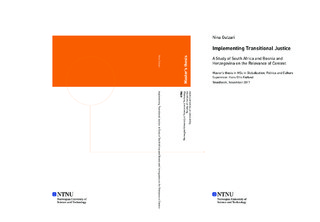| dc.description.abstract | When states emerge from violent conflicts or authoritarian oppression, there is a need to address violations of human rights and the underlying causes of the conflict. Without accountability and acknowledgement to the committed crimes, the grievances may linger and continue to boil under the surface and pose a risk of re-emergence of conflict. Transitional justice encompasses the mechanisms at hand for dealing with the past and its memories, consisting of both retributive and restorative, i.e. judicial and non-judicial mechanisms. By studying the cases of South Africa and Bosnia and Herzegovina, this thesis illustrates the two paths of transitional justice, and demonstrates the importance of context on the choice, implementation, and operation of such mechanisms.
It is also evident, through studying the two cases, that no type of mechanism alone can address the many challenges and damages that follow conflict. To address the manifold of issues, there is a need for a comprehensive understanding and implementation of transitional justice. | nb_NO |
